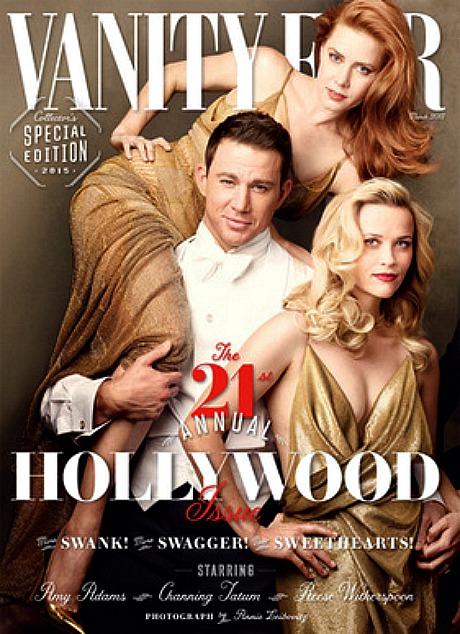


(l.) Miles Teller with faint moustache on cover of new Vanity Fair Hollywood issue; (r.) Warren William, a.k.a. “King of Pre-Code”, specialized in rakes and villains, peaked during the ’30s.
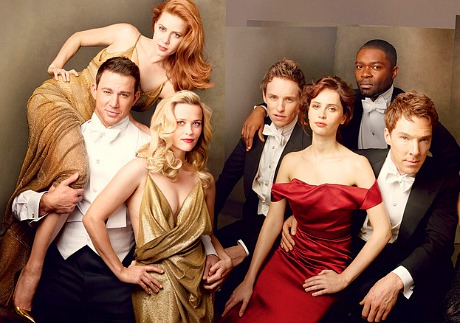






“The Imitation Game is far from a brave movie in any way when it comes to Alan Turing’s personal life,” says The Daily Beast‘s Tim Teeman in 2.3 article called “The Imitation Game‘s Big Gay Lie.” “It backtracks on his sexuality, and for [the film to] to now wear its gay-pride badge to get liberals on side for Oscars votes is laughable and ludicrous.
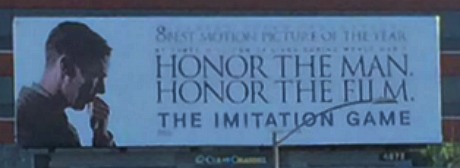
“To boil it down: fantastic campaign, but the most cowardly, wrong-headed film to hang it on.”
The Weinstein Company release “focuses on the cornerstone of Turing’s work, cracking the German Enigma Code of World War II,” Teeman notes, “[but it] barely addresses Turing’s sexuality. We see no relationships, no trysts, no sex — and this from a film that now wants the repeal of convictions of men like Turing persecuted under a law based around gay sex.”
“Set in some kind of verdant, overgrown, foreclosed-upon urban shithole pockmarked with abandoned homes and scuzzy buildings, Lost River is really out there and a lot of it (okay, most of it) is driven by what could politely be called dream logic. That’s a nice way of saying some of it doesn’t make a lot of basic sense. There are mentions of a collapsed economy and a woman having taken out a home loan that she shouldn’t have so it’s obviously a post-2008 realm. There are predatory creeps roaming around like the feral bad guys in Robocop, and there are little pockets of normality and decency and respect for life and property. There are things that happen every so often without apparent motivation but with films like this you have to roll with the imaginative flow.” — from my 5.20.14 Cannes Film Festival review.
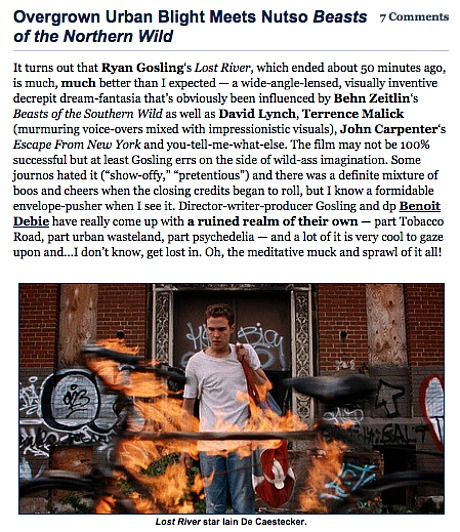
No Exit “is a depiction of the afterlife in which three deceased characters are punished by being locked into a room together for eternity. It is the source of Sartre’s especially famous and often misinterpreted quotation ‘L’enfer, c’est les autres’ or ‘Hell is other people’, a reference to Sartre’s ideas about the perpetual ontological struggle of being caused to see oneself as an object in the world of another’s consciousness.”
An Instagram post indicates these shoes are owned and being worn by Todd Gilchrist, film critic for TheWrap, The Verge and The Playlist. I realize some might say I’m no one to talk with my fondness for canary-yellow sneakers, but these are the ugliest shoes I’ve ever seen in my life, hands down. I used to think that gray cross-training shoes were the worst…no longer! Light yellow, light teal, pink and dark blue with a revolting light gray sole. Just saying. Wow.

This insert shot from Rosemary’s Baby lasts for a good three or four seconds, and for a reason. You’re supposed to read this half-sentence and go “what does this mean?” It’s from a journal kept by a recently-deceased elderly woman who had come to know (or more precisely “associate” herself with) Roman and Minnie Castevet, her next-door neighbors in the Branford. First-time watchers of this Roman Polanski classic have no way of knowing what she meant but those who’ve seen it know exactly what and why she’s dead.
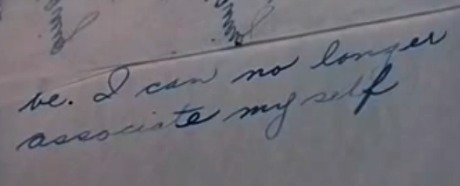
I’ve never experienced a more radically different reaction to a pair of successive films by a gifted director than in the case of Drive vs. Only God Forgives. And they both happened in Cannes. I literally levitated out of my seat during my Salle Debussy viewing of Drive, blissed and beaming, and I suffered like a dog — contorted, appalled and groaning — as I sat through Only God Forgives. But Refn is a serious filmmaker — I know that. And a gracious man. A few weeks ago I met him at a Fox holiday party and he was smiling and cool and amused, telling me on top of everything else that my God pan was a kind of compliment. That makes him one of the nicest directors I’ve spoken to under these circumstances since Anthony Minghella.
“In Cloud Atlas, the Wachowskis wildly overreached while tackling the notion of reincarnation via a daring, genre-spanning nonlinear narrative that challenged the very limits of conventional storytelling. Now, with Jupiter Ascending, the subject arises once again, albeit in the most banal, been-there-done-that way imaginable: as a garish, Phantom Menace-esque space opera in which a lowly Russian cleaning lady (Mila Kunis) is born with DNA identical to that of the most powerful woman in the universe. The movie refers to this statistical improbability as a ‘recurrence,’ which could also describe the painfully familiar feeling we get from watching the Wachowskis fail once again, this time on an unrecoverable $175 million budget. After this debacle, it will be a long time before the kind of recurrence where anyone trusts the duo with a budget anywhere near this scale again.” — from Peter Debruge‘s 2.2 Variety review.
Cameron Crowe‘s Hawaii-based romcom, frequently referred to within the archives of Hollywood Elsewhere as Son of Deep Tiki in lieu of having an official title, has finally been given a title — Aloha (Columbia, 5.29). My first reaction was that it has a resigned, downish sound as “Aloha” tends to mean goodbye more than hello. (It’s defined in Billy Wilder‘s One, Two, Three as “Hawaiian for ‘get lost.'”) So right away you’re assuming it’s a love story with a melancholy vibe. It sounds less calamitous to be called Aloha rather than Untitled Cameron Crowe Project, but I honestly prefer Son of Deep Tiki. At least that has something that makes you go “hmmm…fuck is that about?” At least it triggers a little curiosity while Aloha just sounds like some guy about to get on a plane and saying to himself “okay…fuck it, I’m gone.”

This is one of the most intelligent, engrossing, chapter-by-chapter “making of” docs I’ve ever seen. Absolutely necessary viewing if you love Rosemary’s Baby. It’s included in the Criterion Bluray of Rosemary’s Baby, which came out in October 2012.
One of my last Sundance viewings was I’ll See You In My Dreams, a mild-mannered septuagenarian love-affair drama with Blythe Danner and Sam Elliott. We’ve all accepted the everything-older-is-younger theology (i.e., 70 is the new 60) and so it doesn’t exactly feel like a head-turner when Danner’s Carol Peterson, a widower somewhere around 70, hooks up with the same-aged Bill (Elliott), a mellow, white-haired dude who owns a boat. The only unusual and frankly unbelievable aspect is hearing that the slim, good-looking Peterson hasn’t been intimate with anyone for 20 years, which is when her husband passed.
Everyone understands mourning and recovery, but pretty ladies in their 50s don’t become nuns because their husbands have died. Sooner or later they get back into it because sex is the nectar of life and the grand metaphor of appetite and engagement. Not schtupping means quitting on some level. It means you’re “too old”, and who wants to live a life that doesn’t include that intrigue? Not having sex is in the same boat as not enjoying good food, not hiking, not bike-riding, not petting your dog, not campaigning for a cause or a candidate, not laughing, not going to parties, not cooking, not visiting Italy, etc. It’s anti-life. Especially if you’re still slim and fetching, as Danner/Peterson clearly is.
Which is why it seems rather…well, surprising or curious that Danner has told Indiewire‘s Anne Thompson in a just-published interview that she was a little nervous about kissing Elliott because she’s out of practice. She says, in fact, that “I haven’t had a real kiss in 13 years,” or since her husband, Bruce Paltrow, passed on.
My personal favorite among the seven Virtuosos celebrated last night at the Santa Barbara Film Festival was and is Obvious Child‘s Jenny Slate, whom I finally spoke to last December after waiting too many months to see her film. In a group discussion at the end of the show, moderator Dave Karger asked for some favorite psycho/bastard performances, and Slate had the coolest reply when she singled out Ruth Gordon‘s performance as a nosy, maternal-minded Satanist in Rosemary’s Baby.
Besides Slate the Virtuosos were Selma‘s David Oyelowo (witty, verbose, insightful), Gone Girl‘s Rosamund Pike (aloof), Fury‘s Logan Lerman (modest, self-effacing), Get On Up‘s Chadwick Boseman (engaging, quite funny, fast on his feet), Boyhood‘s Ellar Coltrane (low-key) and Whiplash‘s J.K. Simmons, who committed the evening’s only fashion faux-pas by wearing light blue dress socks with a dark suit.